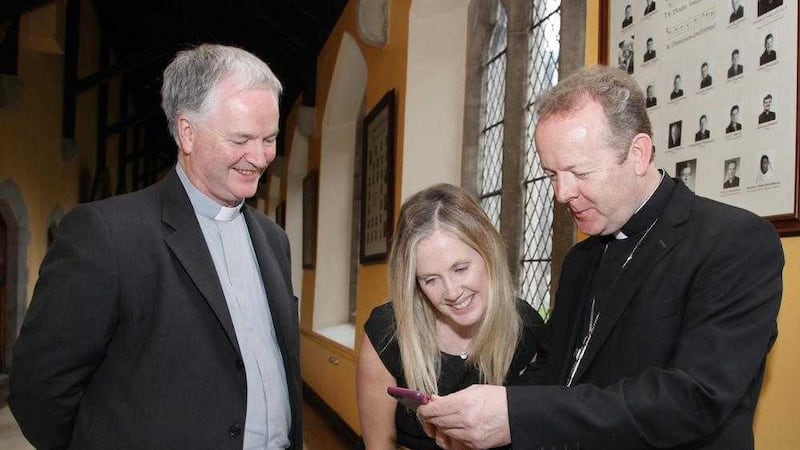THE media played "a vitally important role" in exposing the scandal of clerical child abuse in the Catholic Church, Archbishop of Armagh Eamon Martin has said.
Speaking at a conference to mark the 40th anniversary of the Maynooth-based Catholic Communications Office, Dr Martin acknowledged that the "relationship between the Church and the media has changed considerably over the past 40 years and has sometimes been fraught".
"At times we in the Church have reacted defensively, complaining of being unfairly targeted or singled out," he said.
"Gradually we have come to accept that the media has played a vitally important role in lifting the lid on a terrible and shameful chapter in our history, giving a voice to many who had been carrying a lonely trauma for years, driving the development and implementation of better practice not only in the Church but throughout society."
Dr Martin said that despite the enormous technological changes since the office's formation in 1975 - from floppy discs and word processors to the internet and mobile phones - communication remained, at heart, social.
"Whenever the Second Vatican Council in 1963 issued its decree, Inter Mirifica on the media of social communications, it spoke very positively about advances in technology and the opportunities that these might provide for the spread of the Gospel," he said.
"The Council Fathers could never have anticipated the transformations in technology that we have witnessed over the last five decades, but they did point out prophetically that communication cannot simply be about the exchange of information; more importantly communication is always 'social' - it is about the development of good human relations."
He said the essential aim of Church communication was "to promote the truth of the Gospel, to multiply goodness, to enhance beauty in the world and to serve the common good".
"When it comes to communications strategies, Pope Francis has echoed, by word and example, the positivity of the Inter Mirifica decree and he has responded to its challenges," said Archbishop Martin.
"He says: 'The Church needs to be concerned for, and present in, the world of communication, in order to dialogue with people today and to help them encounter Christ.
"'She needs to be a Church at the side of others, capable of accompanying everyone along the way.
"'The revolution taking place in communications media and in information technologies represents a great and thrilling challenge; may we respond to that challenge with fresh energy and imagination as we seek to share with others the beauty of God.'"
He said he had particularly witnessed how the news media intersects with the life and mission of the Church at last month's synod on the family in the Vatican
"At every break in the Synod, microphones and cameras were everywhere to be seen. EWTN had taken over a rooftop studio on Via della Conciliazione; Vatican Radio issued regular bulletins and Fr Federico Lombardi organised a daily press briefing to keep everyone up to date with the Synod proceedings.
"Then there was the social media - bloggers and twitterers speculating, commenting, eager to interpret and counter-interpret what was going on inside the Synod Hall or in the discussion groups.
"There were even blogging bishops, prelates on Facebook, cardinals on Twitter and YouTube, all doing their best to respond to the voracious appetite for 24/7 news - despite the fact that the Synod's deliberations were much too ploddy to provide the kind of variety and spice that the hungry communications world needs to survive."
He said his synod experience had inspired him to reflect on two key facets of Church communications: "One is how we communicate 'ad intra' with each other and the faithful in the Church; the other is 'ad extra' - how we get our message out to others in the 'secular' media world, including those who already have their mind made up and their story more or less written."
The conference's keynote speaker was Monsignor Paul Tighe, secretary of the Pontifical Council for Social Communications, who spoke about 'The Church in a Digital World - Sharing Good News'.
Other contributors included Jesuit Fr Tom Casey, a lecturer in philosophy at Saint Patrick's College, Maynooth, whose address was titled 'The creative and destructive power of words - sticks and stones may break my bones, but words will really hurt me'.
He proposed what he called "three creative 'languages'" which correspond to "the three tenses of every human life: the past, the present, and the future".
"We could call these three languages the Emmaus language, the Evangelical language, and the Easter language," he explained.
"The Emmaus language teaches us to look at our past in a positive way, to discover seeds of peace where we once only found grounds for fear... The Evangelical language helps us to live in a new way in the 'now'... The third language, the Easter language, helps us hope that despite signs of decay and death, our ultimate future is life in all its abundance...," said Fr Casey.








